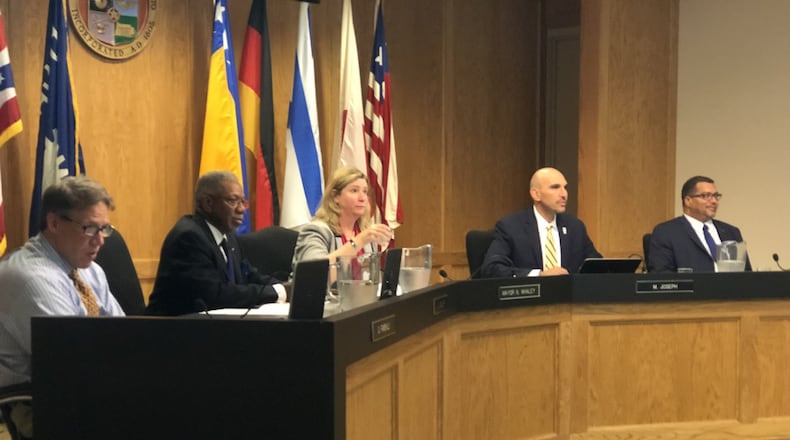The proposed revisions were developed by a charter review committee, and the Dayton City Commission is expected to decide tonight whether to put the changes before voters for consideration.
One proposed amendment would authorize the city’s chief examiner to establish a new process for selecting police and firefighter recruits based on “merit, efficiency, character, industry and conduct.”
This would permit the city to modify its hiring process, so that police and fire candidates could be evaluated and selected not just based solely on how they score on exams.
The proposed revisions would give the city flexibility to develop a testing and hiring process that better suits its needs, said Ken Couch, Dayton’s human resources director.
Right now, police and firefighter candidates are hired in the order they scored on exams ― from highest to lowest, assuming they are not disqualified for other issues. This selection process is called the rule of 1.
The charter amendment proposal would allow the city to adopt a selection process that includes, but is not limited to, a Rule of 3, Rule of 10 or banding, said John Musto, chief trial counsel with the city.
Under a rule of 3, the city could hire any one of the three candidates with the highest scores. Under the rule of 10, the city could hire any of the top 10 candidates with the best scores.
Banding, by comparison, would put candidates into groups based on their test scores.
The city could then select to hire candidates those groups, based on other considerations, such as their backgrounds, life and work experiences and oral interviews.
The changes were recommended by members of one of the police reform committees, which wants to increase diversity in the police department and thinks the rule of 1 is a barrier to recruitment and achieving that goal, said Torey Hollingsworth, senior policy aide in the mayor’s office.
Another proposed amendment would change the method for determining the mayor’s and city commissioners’ compensation, which if approved likely would result in pay increases.
Currently, a board appointed by the city commission determines their compensation.
The proposed charter changes would eliminate the compensation board and tie city leaders’ pay to the salaries of the Montgomery County board of commissioners.
The mayor would earn 75% of what the top-paid county commissioner receives. City commissioners would get half of the highest-paid county commissioner’s salary.
The charter review committee decided not to pursue new language to make Dayton’s mayor full-time. But some members think increasing the mayor’s pay will help attract quality candidates.
Another charter amendment would effectively remove some restrictions on city employees to engage in political activities.
Generally, most city of Dayton employees generally are not allowed to participate in off-duty political work. Some city officials and charter review committee members believe this policy is likely unconstitutional.
The proposed charter revisions would specify that classified city employees only would not be allowed to get involved in Dayton municipal election campaigns, including for the offices of the mayor, city commission, municipal judges and municipal clerk of courts.
Voters also may be asked if they wish to codify in the city’s charter that Dayton’s water system and infrastructure should remain public.
The proposed language says, “Such resources and infrastructure, within the city of Dayton municipal boundaries shall not be sold, leased or transferred into private ownership.”
Another charter change would authorize the city to hold meetings remotely during emergencies, like it has done during the coronavirus pandemic.
The commissioners today likely will decide whether to put the charter change questions on the May 4 ballot.
The charter proposals will only appear on the May ballot if the city commission or mayor races require a run-off election. If they don’t need a special election, the proposals would appear on the November ballot.
The charter review committee developed the proposed revisions after meeting six times, starting in early January.
About the Author


